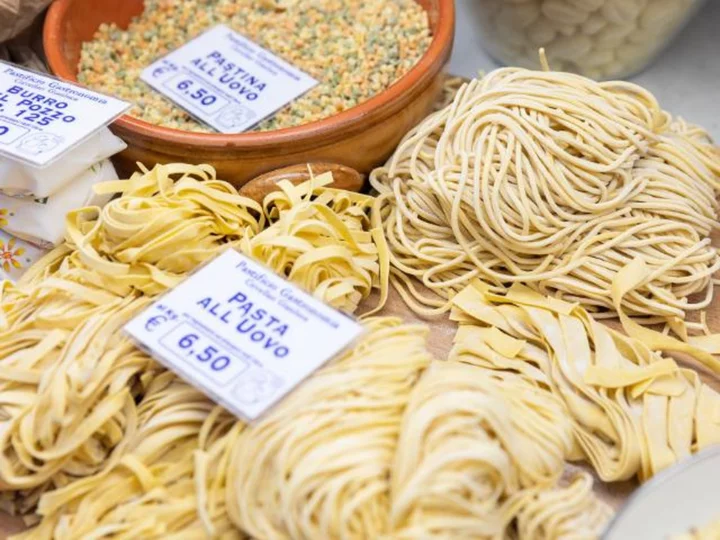Italy's government convened crisis talks Thursday to investigate the reasons behind a surge in prices for pasta, one of the country's most beloved and culturally important foods.
Adolfo Urso, the country's minister for enterprise, chaired a commission of lawmakers, pasta producers and consumer rights groups in Rome to discuss what could be done to bring down pasta prices, which soared 17.5% in March from the same month in 2022.
That climb was more than double Italy's broader measure of consumer price inflation — which stood at 8.1%, according to EU statistics. Pasta prices have soared despite the price of wheat — the main ingredient — falling in recent months.
A spokesperson for Urso said in a statement Wednesday that many producers had already provided assurances that increases in pasta prices were only temporary, and had attributed the high prices "to the disposal of inventories [of pasta] made when the cost of raw materials was higher."
"In a few weeks, prices will be lowered, as production costs have considerably reduced," the spokesperson added.
This is a problem of national significance. The average Italian consumes about 23 kilograms (51 pounds) of pasta each year, Furio Truzzi, president of Assoutenti, a consumer rights group, said in a statement last month. That's the same weight as a standard piece of checked baggage allowed on a typical flight, and works out at just over 60 grams (2 ounces) every day.
"Pasta is one of the foods most loved by Italians," Truzzi noted. But Russia's invasion of Ukraine last February had unleashed a "tsunami" of high prices last year for some of the raw materials needed to make pasta, he said.
"Today the situation appears different," Truzzi added, noting that some input costs have fallen.
'Little justification' for price rises
Coldiretti, Italy's biggest farmers association, said that these higher retail prices had not translated into higher revenues for farmers of durum wheat, who were struggling to meet their own costs.
The price of durum wheat — a type of wheat popular among Italian pasta-makers — has fallen 30% since May 2022. Making pasta only requires mixing water with the wheat, the group said, giving "little justification" for the huge increase in retail prices.
The farmers group added that, despite the price of durum wheat being fairly uniform across Italy — at about €0.36 cents (39 cents) per kilogram — the retail price of pasta varied widely in different regions.
According to an Assoutenti analysis, commissioned by the government and published in April, the average price of a one kilogram box of Barilla spaghetti, rigatoni and or penne pasta — staples in many Italians' cupboards — rose from €1.70 ($1.86) to €2.13 ($2.33) in the year to March, an increase of more than 25%.
But price rises fluctuated widely between regions, with the province of Siena in Tuscany notching an increase of more than 58%, while Alessandria, in Italy's northwest, only saw a rise of 4.6%.
Family-owned Barilla, based in Parma, is the world's biggest pasta maker, according to Reuters. It did not immediately respond to a CNN request for comment.
Assoutenti, along with Urso, have suggested that prices may have been inflated artificially to boost profits, with the fallout from the war in Ukraine used as a cover. They haven't blamed specific companies.
Ivana Calò, spokesperson for Unione Italiana Food, which represents food producers, told CNN that the price of pasta on shelves is greatly influenced by the price of energy, packaging and logistics. These inputs, Calò said, have all increased in price, though she did not specify over what time period.

